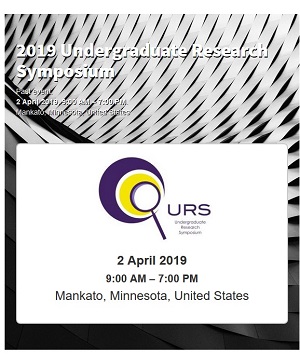What Worked?: An Exploratory Investigation into the Symbolic Importance of Family Strengths
Location
CSU Ballroom
Start Date
2-4-2019 2:00 PM
End Date
2-4-2019 3:30 PM
Student's Major
Family Consumer Science
Student's College
Allied Health and Nursing
Mentor's Name
Dan Moen
Mentor's Department
Family Consumer Science
Mentor's College
Allied Health and Nursing
Second Mentor's Name
Jae Min Lee
Second Mentor's Department
Family Consumer Science
Second Mentor's College
Allied Health and Nursing
Description
‘What Worked' is a retrospective cross-sectional, quantitative research study about the perception of family strengths according to young adults. Specifically, this study investigated family strengths as participants reflected on their own, unique childhood experiences in the following three categories: (1) Parental Love (What did your primary caregivers do to show love?); (2) Family Bonding (What did your family to do bond?); and (3) Parenting (How did your parents shape you into the person you are today?). This study surveyed college students and asked their reflection on family experiences and what worked for them. The analytic sample size was 47 respondents after excluding those with incomplete answers. This study conducted descriptive and word cloud analyses.
This study found that ‘laughter', ‘affection' and ‘support' were the most frequently answered words in the Parental Love category. In the Family Bonding category, ‘events', ‘vacation' and ‘dinner' were found. Those of the last category were ‘affection', ‘discipline' and ‘support'. This study found it notable that the word ‘support' was the leading fundamental in both the first and third category. Guided by symbolic interaction theory, this study hypothesizes that these young adults will be more likely to practice similar family strengths in their own families of creation. Findings from this study can provide clues into what current, young adults value in terms of family.
What Worked?: An Exploratory Investigation into the Symbolic Importance of Family Strengths
CSU Ballroom
‘What Worked' is a retrospective cross-sectional, quantitative research study about the perception of family strengths according to young adults. Specifically, this study investigated family strengths as participants reflected on their own, unique childhood experiences in the following three categories: (1) Parental Love (What did your primary caregivers do to show love?); (2) Family Bonding (What did your family to do bond?); and (3) Parenting (How did your parents shape you into the person you are today?). This study surveyed college students and asked their reflection on family experiences and what worked for them. The analytic sample size was 47 respondents after excluding those with incomplete answers. This study conducted descriptive and word cloud analyses.
This study found that ‘laughter', ‘affection' and ‘support' were the most frequently answered words in the Parental Love category. In the Family Bonding category, ‘events', ‘vacation' and ‘dinner' were found. Those of the last category were ‘affection', ‘discipline' and ‘support'. This study found it notable that the word ‘support' was the leading fundamental in both the first and third category. Guided by symbolic interaction theory, this study hypothesizes that these young adults will be more likely to practice similar family strengths in their own families of creation. Findings from this study can provide clues into what current, young adults value in terms of family.
Recommended Citation
Koebele, Katie; Nicole Motz; Danielle Bjornheim; Kelsey Wall; and Kali Pecha. "What Worked?: An Exploratory Investigation into the Symbolic Importance of Family Strengths." Undergraduate Research Symposium, Mankato, MN, April 2, 2019.
https://cornerstone.lib.mnsu.edu/urs/2019/poster-session-B/27




